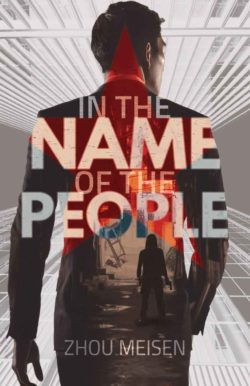In the Name of the People, by Zhou Meisen
translated by Emily Hein
Sinoist Books, 2020
Publisher's Blurb
Not everyone wants you to succeed… Comrade
ATTENTION ALL PARTY BODIES OF H PROVINCE:
After consultation with relevant authorities it has been determined the local state organs have failed to undeviatingly serve the people of H province, and the entire local apparatus is riddled with corruption. Attempts to rectify the situation have failed because morally degenerate senior officials have resorted to increasingly desperate measures to cover their tracks. Effective immediately, Comrade Hou Liangping, veteran of the Central Anti-Corruption Bureau, is to be sent to the province to help expedite a resolution to this crisis. Every assistance will be given to Comrade Hou. Any deviation from this directive will be identified and strictly disciplined.
END OF MESSAGE.
Reading Chinese Network Reviews
Reviewed by Andy Thomas, 1/4/20
 Above all else, this is a sorry story of money, lust, marital charades, and money, set in the time of the economic reform which “hit China like a wave” and swept many Party cadres into a pit of corruption.
Above all else, this is a sorry story of money, lust, marital charades, and money, set in the time of the economic reform which “hit China like a wave” and swept many Party cadres into a pit of corruption.
In its detail, density, and revelation, Zhou Meisen’s account of the investigations of Procurator Hou Liangping, here a work of fiction, reminds me of Robert Caro’s biography of Lyndon Baines Johnson, thus fulfilling the author’s commitment to “critical realism”. In both books, the real political biography and the work of fiction, the reader has to decide what is acceptable and what is not. Zhou draws the line at direct personal financial benefit in the public service, while with Johnson, no stranger to the fat brown envelope, that line is always elusive.
Hou’s master, Professor Gao, explained it from a lofty position thus: “China’s reform and opening up was grandiose. Each person found themselves in the midst of a powerful current. During that time, some people through their own efforts or through luck stood on the crest of the wave. On the crest of the wave the scenery and the allurements were limitless, but the risks were also infinite!” (p.509).
Early in the novel the attitude is revealed: “Freedom is whatever the law doesn’t forbid!” I have come across this same saying, as an expression of liberty, in the post-Soviet Russian Federation. In both cases, assets previously held in common were transferred to the private sector: one of Hou’s earliest contacts lives in an apartment transferred in this way, and Hou notes he is apparently siphoning off the water “for free”.
Hou is in a complex social network of thirty-four characters and much of the novel concerns itself with their various transactions and interactions. His career advice is clear: “If you don’t draw close to the first-in-command, don’t frequently appear in his line of sight, and then turn the first-in-command into a ‘political resource of yours, then you can’t show up in the high-ranking sphere of observations.” (p327). In H province, money, sexual favour, or money, makes you appear in the line of sight. The men say there’s a waiting list of women cadres willing to sleep with the Minister to gain their accreditation, and the lower courts are clogged with “economic conflicts” over money and company finance. Hou is called in to deal with the bigger picture of rampant institutional corruption.
In the nightmare of Party meetings, it’s your and her (or his) continuous rapid assessment of how someone within the network would view your assessment of her as implied by your action. As a senior cadre, you are perpetually juggling perceptions of past and present precedents and there is always someone to put in a bad word about you, whether you are present or not.
Inevitably, for doing good against evil, and pulling the strings of the network too hard, Hou is accused of corruption. The allegations are false. But Zhou writes with feeling “Having investigated and interrogated those suspected of malfeasance crimes for half his life, he was now suspected of malfeasance. The agony was beyond words; millions upon millions of pins and needles were being stuck into him at random on the inside, poisoning his very marrow”. This, based on my experience, is very well expressed.
Translator Emily Hein contributes an excellent account. I like her footnotes; I might have added the Chinese phrase “近水楼台 jìn shuǐ lóu tái, meaning that “the tower near the water can see the moon first” to the account of the Moon reflected in the lake, and the watchtower at the condemned factory, giving the implication that those in the factory could see first what was coming. I find the joint account of delays and bad coffee at Chinese airports, of a run-down apartment block, political access to the telecommunications cell base station, and the metaphor of the thunderstorm cell over Beijing, to be vivid and true to modern Chinese urban life.
Where is “H Province”? I would look to the North-East. But this novel speaks to political corruption throughout the world and should not be limited in its indictment to modern China. After all, they sent Hou Liangping to sort it out.
Reviewed by Andy Thomas
